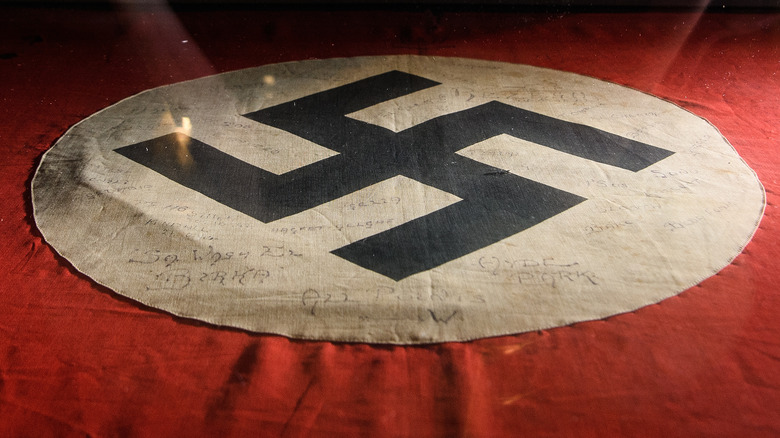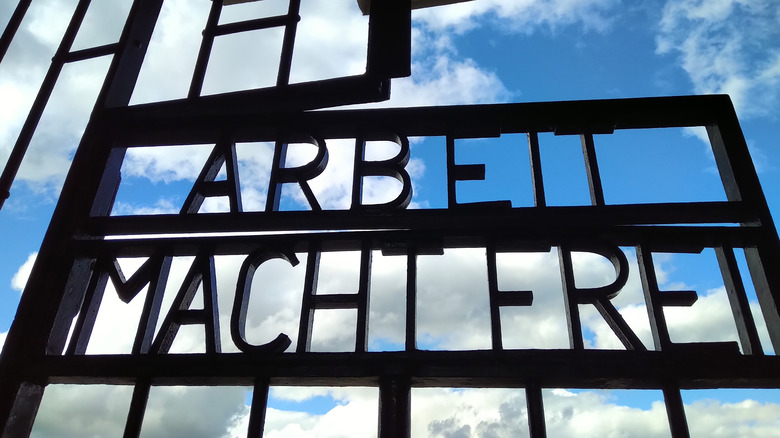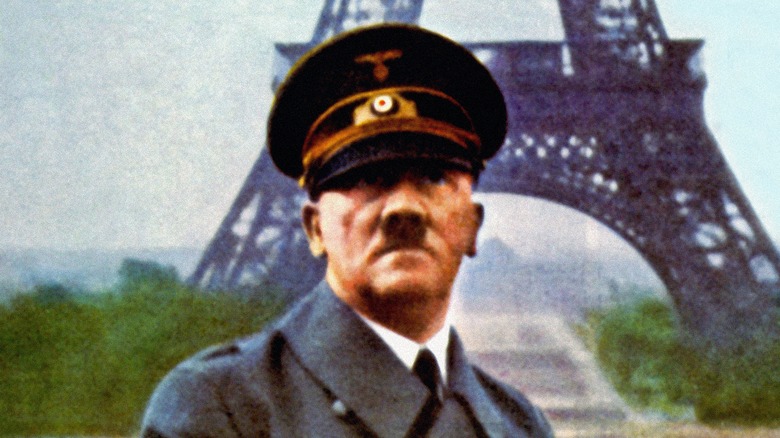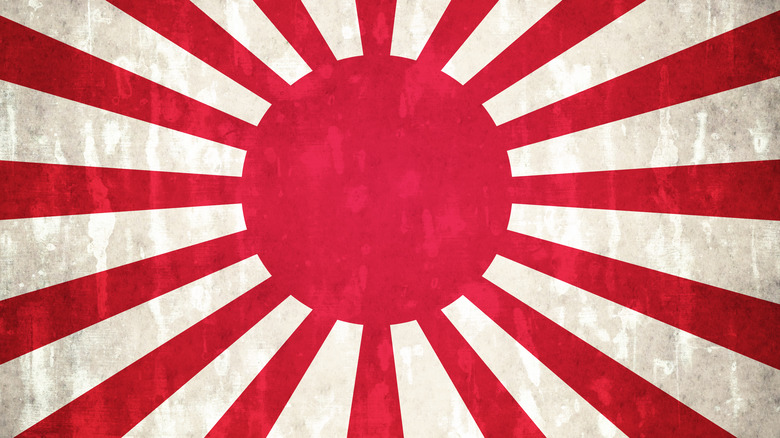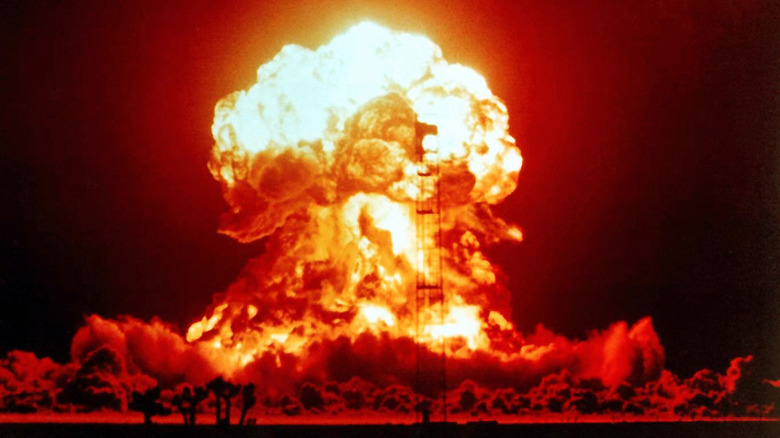Is This What The World Would Look Like If Hitler Had Won?
World War II was like a spider's web of human suffering, with Nazi Germany as the vicious spider at its center, scrambling for control. That spider was finally squashed, so to speak, on April 30, 1945. As the Red Army overran Berlin's last defenses. Adolf Hitler — then, perversely, the most influential man in the world — swallowed a lethal dose of cyanide and shot himself in his bunker. The rest is history.
But history is never as inevitable as it may seem. As Mark Grimsley at HistoryNet describes, the war was never a sure victory for either side, much less for Adolf Hitler's first main enemy, the U.K., which barely held on through the worst of the Blitz. The Soviet Union would go on to become Hitler's second-greatest enemy. We sometimes forget how astonishing those Nazi victories truly were. Grimsley mentions, among other facts, that German soldiers pushed their way to within sight of the Kremlin in Moscow.
So what if the U.K. had given in to the bombing, or if the invasion of Russia had gone according to Germany's plan, or if the America First movement had talked Roosevelt out of joining the war in Europe? What would the world be like now?
A HOLOCAUST OF 9 MILLION
It's a well-known fact that the Nazis killed 6 million European Jews as part of the so-called Final Solution (as well as large swaths of other vulnerable populations). The genocide ended with the Allied invasions of Germany and Poland at the end of the war, as part of the German defeat. Had Adolf Hitler and the Germans never lost, the program of organized death would likely have continued apace, presumably on track to kill off much more of the Jewish population on the continent.
Horrific as the legacy of the Holocaust has been, could it have been even worse? The Holocaust Encyclopedia, published by the U.S. Holocaust Memorial Museum, puts the total Jewish population of Europe at about 9.5 million. By these figures, another 3.5 million people could have eventually been killed — adding even more souls to the already grim tally. The real figure may have been slightly lower, though, as the 9.5 million cited included the Jews of the Soviet Union, a few tens of thousands of whom lived in the Autonomous Jewish Oblast on Russia's Chinese frontier (via NPR), far from Nazi territorial ambition. Nine to 9.5 million people seems like a reasonable and inevitable — if truly bleak — toll.
AN EMPIRE TO THE URALS
Adolf Hitler was serious about establishing a new German land empire. By 1942, Hitler ruled most of the European continent and huge swaths of the Soviet Union as well, all the way to the Caspian Sea (via Britannica).
Contrary to popular belief, though, Adolf Hitler didn't aim to conquer the world. He planned for Russia's Ural Mountains to form the eastern perimeter of the Third Reich. It's unclear, though, what Hitler wanted to do with the U.K.; the Nazis had planned "Operation Sea Lion" to occupy the British Isles, per BBC HistoryExtra, but Hitler seemed to go back and forth on whether England belonged in the Third Reich in the cultural sense.
"Operation Sea Lion" would have been a bloodbath if it had ever been launched, but its corollary, Operation Green, the plan to invade Ireland, would likely have gone much more smoothly for the Germans. The Irish Times reports that the Irish army was seriously outgunned, with many of its divisions relying on bicycles, earning them the sneering nickname of "Peddling Panzers." But as in England's case, it's not clear that the Celtic island was Third Reich material. We can imagine that after its occupation (and the extermination of its Jews and other vulnerable peoples), Ireland might have been permitted a nominal independence and a docile, pro-German dictator.
JAPAN COULD BE THE BIGGEST COUNTRY IN THE WORLD
It's not guaranteed that Japan would win its war against the Allies if Germany won its own — but a German victory would mean the subjugation of the British Empire, including Australia, as well as the Soviet Union and possibly the United States. With its enemies out of commission, Japan's brutal expansion would theoretically meet almost no opposition. Japan would be the master of the Pacific, from the western shores of North America to the border of India. It would have been the biggest sovereign power in the world.
Grimsley notes once Hitler had seized the oil and rich farmland west of the Urals, he planned to hand the rest of the defunct Soviet Union to Japan. The Empire of the Rising Sun would certainly have swallowed more of mainland China; all the American territories in the Pacific, like Hawaii and Guam; all of Southeast Asia; and, possibly, Alaska (per History and ThoughtCo). Japan had already taken British colonies like Singapore, many of which are major economic forces today. If Japan had enforced its own autarkic economic policies on these islands, the 21st-century economic landscape would be completely different — without Asian trade and manufacturing, there would be no globalization.
Germany, too, had Pacific colonies directly in the Japanese Empire's path. It's unclear whether Hitler would have had to concede Germany's former Pacific colonies to his Asian allies, or if he would fight to reclaim them (via the National Library of Australia).
A GERMAN-SPEAKING AFRICA?
Germany lost its colonies (including all outside the borders of Europe) in the Treaty of Versailles, which effectively ended World War I. These included the aforementioned islands in the Pacific, but more importantly a significant number of African territories as well, such as Cameroon and Togo in the west of Africa, Tanganyika (now Tanzania) and Burundi in the east of Africa, and Namibia (location of the sign in the photo above) in Africa's southwest (via New World Encyclopedia). Hitler was determined to restore German control of these countries. He also planned to seize the colonies of his defeated European rivals, most notably France and Britain. Most of Africa, besides the Italian, Vichy French, and the Spanish enclaves, would likely be speaking German and flying a swastika banner.
HistoryNet notes that the Nazis enjoyed a fair amount of support among some of South Africa's Afrikaner population, which had historically opposed British rule and was quite experienced in creating and dominating a racial underclass. Some South Africans even formed pro-Nazi militias in anticipation of their unification with the Third Reich, as New Frame reports. It's not hard to imagine an African managerial caste, reporting to Berlin and manned by Afrikaners, enforcing some version of apartheid from the Sahara to Madagascar.
WOULD ATOM BOMBS FALL IN EUROPE?
So what about the fate of the United States? According to HistoryNet, Hitler had no plans for invading the USA. In fact, he underestimated America's fighting capability, refusing to believe that a nation of "mongrels" could defeat his own Aryan empire. The logistics, too, would have been more than daunting. With the Wehrmacht already stretched thin across Europe and Africa, occupying another large continent would have been impossible. Canada, a British subject, might have fared worse, with Hitler as its head of state instead of King George VI.
This means, however, that the United States could potentially keep fighting. Grimsley at HistoryNet suggests that another atom bomb might have ended up dropped on Berlin or another European city, decimating them like Hiroshima and Nagasaki. In 1941, the U.S. Air Force began work on the Convair B-36 bomber, which could reach Berlin from a Canadian airbase without refueling. The B-36 would not be ready for mass production until 1948, the year America's atom bomb arsenal reached 50 warheads. That's 50 cities' worth of carnage — enough, perhaps, to bring the worldwide Third Reich to its knees.
